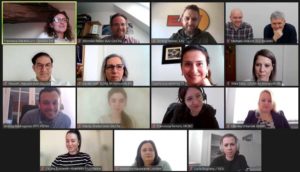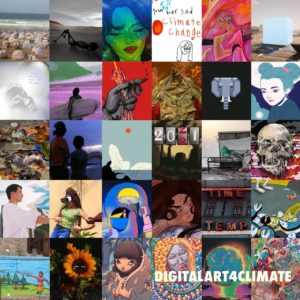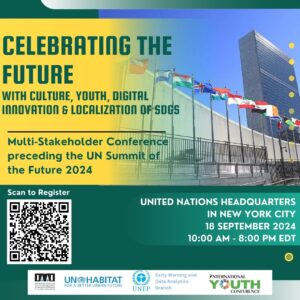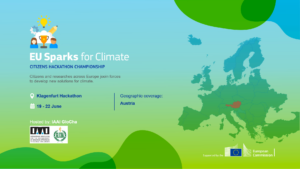Global Citizens and Multi-stakeholder Partnerships in Global Sustainable Development Governance – report from IAAI activities @ ACUNS AM 2011
Michael Platzer (ACUNS Vienna Liaison Office www.acuns.org/about_us/vienna_liaison_office) and Miroslav Polzer (International Association for the Advancement of Innovative Approaches to Global Challenges IAAIwww.glocha.info) organized a Round table discussion on “Engaging Global Citizens in Sustainable Development Governance: Human Rights and Human Responsibilities” (the rationale of the Round table event as well as the list of speakers can be found below) at this year’s Annual meeting of Academic Council on the United Nations System ACUNS http://www.acuns.org/annual_meeting/annual_meeting_2011 in Waterloo/Ontario (Canada) June 3rd 2011. The subject of ACUNS AM 2011 has been “Multiple Multilateralisms”.
An extraordinary valuable input to the round table has been a video message of Mr. Felix Dodds, director of Stakeholder Forum http://www.stakeholderforum.org/ who emphasized the importance of multi-stakeholder partnerships in sustainable development governance and the need for the scientific assessment and further development with the help of global governance / international relations experts like members of ACUNS. Mr. Dodds highlighted the historic importance of UN Conference on Sustainable Development Rio +20 www.uncsd2012.org/ and invited ACUNS members to the conference Planet under Pressurewww.planetunderpressure2012.net March 2012 in London which will be the most important global conference of scientists related to Rio +20 conference. The video message of Mr. Dodds can be found herehttp://vimeo.com/25450053
The round table has been introduced by the presentation “Cultural Dimensions of a Multilateral World” of Zuzana Lehmannová, Jan Masaryk Centre of International Studies, University of Economics Prague (video:http://vimeo.com/25464582)
Miroslav Polzer introduced the Round table and IAAI/GloCha initiatives: http://vimeo.com/25555964
Michael Platzer introduced the concept of Human Responsibilities towards global communities and Art. 29 of UDHR (video: http://vimeo.com/25561060 ; ppt: )
In a first round of discussion the concept of global citizenship has been discussed as well as the conviction expressed that the concept of human responsibilities might be more effective than the philanthropy approach with regard to engaging global citizens in sustainable development governance http://vimeo.com/25476187
next Miroslav Polzer presented some IAAI (GloCha) basic concepts like e.g. a new understanding of “Global Commons” as all the resources needed by present and future generations for sustainable development and the shared social responsibility to build available stocks of global commons, “Global Citizenship Ethics”, “(GloCha) Multi-stakeholder Partnership for Global Commons Growth”, and “GloCha (Rio) Charter on Shared Social Responsibility for Global Commons” http://vimeo.com/25810730
in the discussion that followed http://vimeo.com/25812520 focused on the question of “How shall we live?” in the context of (dynamic) global governance, human rights, human responsibilities, changing technological opportunities etc.
based on expressed interest in the discussion then the IAAI “Global Challenges Song World Cup” initiative https://www.glocha.info/iaai/index.php/swcglocha and its current implementation round “Rio 2012 Youth Song World Cup” have been presented http://vimeo.com/25808807
the next round of discussion focused on
economic arguments related to environmental protection and sustainable development http://vimeo.com/user6412334 and
public policy perspectives and role of access and participation,
followed by some more information on ideas for implementation of GloCha Global Commons Charter related to reporting, funding, global tax, collaborative assessment of sustainable development wealth relevance of contributions .. (video: http://vimeo.com/25820265)
Michael Platzer contributed information on the efforts of Inter Action Council (group of former statesmen and heads of states http://www.interactioncouncil.org/about-us) in 1997 to come forward with a “Universal Declaration of Human Resonsibilities” http://interactioncouncil.org/a-universal-declaration-of-human-responsibilities which did not receive the full endorsement at UN General Assembly; this input of Michael Platzer has been complemented with discussion of the need for distinction between “stake holders” and “rights holders” as those who are affected by sustainable development governance are often not represented in decision making processes (video:http://vimeo.com/25818643)
related to this, Mr. Polzer presented the sustainable development governance innovation idea of a GloCha chair which should be empty at sustainable development governance processes reminding decision makers of the interests of future generations and those who have no possibility to participate in this kind of decision making although they are affected by the outcomes, like e.g. marginalized groups, etc. (video http://vimeo.com/25817650)
The discussions at the round table have been very dynamic and constructive and IAAI/GloCha initiatives have received important intellectual input and – as there hasn’t been voiced any criticism – a certain level of acceptance by academic community as ACUNS is the leading global network of scholars and practitioners dealing with the United Nations System.
Especially inspiring and supportive for IAAI/GloCha initiative has been the ACUNS AM John W. Holmes Memorial Lecture “Multilateralism in a Copernican World” delivered by Bruce W. Jentleson (Professor of Public Policy and Political Science, Duke University). Mr. Jentleson concluded his presentation with the statement that in his view that like the sun is the center of our planetary system, “Global Citizenship” is the sun/center of multiple multilateralism of 22nd century (link to the video: http://www.youtube.com/watch?v=ig0_xpUH_jI)
Additional info:
Friday, 3rd of June in the afternoon Michael Platzer lead also a panel on “Academic-Practitioner Dialogue(s) and Teaching the UN” in which i.a. Mr. Maher Nasser (director of UN DPI Outreach division) and Tibor Toth (executive director of CTBTO) participated and Saturday 4th of June Miroslav Polzer presented a paper on “Multilevel Climate Change Governance from an Innovation System Perspective” in Panel 12: Climate Change Governance: National, Regional and Global Policy Dimensions (the ppt can be downloaded at: ).
Round table Rationale – Global Citizenship Ethics for Effective Global Governance – the Rio 2012 Window of Opportunity!
Global governance solely based on national governments and their coordination mechanisms is not sufficient anymore to cope with the magnitude of global challenges of our time. Resources of global civil society have to be integrated into global governance in order to harness the full potentials of humankind for safeguarding our common future. People all around the world are concerned about the global problems, they know that their wellbeing will strongly be influenced by these global dimensions and they are willing to contribute their fair share to effective responses to these challenges on all relevant levels – thus contributing to effective global governance.
In order for the systemic integration of civic engagement in global governance to function in a coherent way, a shared vision of a range of stakeholders is necessary. Furthermore, new structures and processes for global cross-sectoral coordination, as well as. new institutional and legal frameworks for mobilization of resources are needed . The UN Conference on Sustainable Development www.uncsd2012.org/ in Rio 2012 might be the window of opportunity to achieve this paradigm shift
International Association for the Advancement of Innovative Approaches to Global Challenges IAAI www.glocha.info is working on the development of a multistakeholder partnership model for collaborative global commons growth as global governance innovation for engaging civil society in addressing stustainable development issues.
ACUNS members are kindly invited to provide feed-back and input to these efforts!
Panel 5: Engaging Global Citizens in Sustainable Development Governance: Human Rights and Human Responsibilities – A Roundtable Discussion
Location: BA211
CHAIR: Charlotte Ku, College of Law, University of Illinois
PANELISTS:
“Cultural Dimensions of a Multilateral World”
Zuzana Lehmannová, Jan Masaryk Centre of International Studies, University of Economics Prague
Roundtable contributions from:
Miroslav Polzer, Austrian Science and Research Liaison Office Llubljana
Michael K. Platzer, ACUNS Vienna Liaison Office
Attachments:
- Report IAAI – ACUNS AM 2011 (pdf)
- A UNIVERSAL DECLARATION OF HUMAN RESPONSIBILITIES, Inter Action Council (pdf)
- Paper presentation – Dr. Miroslav Polzer – ACUNS AM Panel 12 2011 Climate Change Multilevel Governance Innovation System (pdf)
- The Individual’s Duties to the Community under Article 29 of the Universal Declaration of Human Rights“ (E/CN.4/Sub.2/432/Rev.2) – study by Special Rapporteur Erica-Irene Daes (Michael Platzer)pdf






